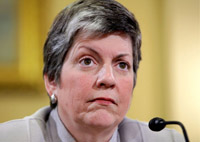PHOENIX Civil rights leaders are urging organizations to cancel their conventions in Arizona. Baseball’s Arizona Diamondbacks are encountering protesters on the road. And the AriZona iced tea company wants everyone to know that its drinks are made in New York.Arizona is facing a backlash over its new law cracking on illegal immigrants, with opponents pushing for a tourism boycott like the one that was used to punish the state 20 years ago over its refusal to honor the Rev. Martin Luther King Jr. with a holiday.”The goal is to as quickly as possible bring to a shocking stop the economy of Arizona,” former state Sen. Alfredo Gutierrez said Friday as a coalition called Boycott Arizona announced its formation.
The outcry has grown steadily in the week since Republican Gov. Jan Brewer signed the nation’s toughest law against illegal immigration. The measure makes it a crime under state law to be in the country illegally, and directs local police to question people about their immigration status and demand to see their documents if there is reason to suspect they are illegal.Many in Arizona support the law amid growing anger over the federal government’s failure to secure the border. The state has become a major gateway for drug smuggling and human trafficking from Mexico.
Critics say the law will lead to racial profiling and other abuses, and they are giving Arizona a public relations beating over the issue.Groups have called on people not to fly Tempe-based US Airways, rent trucks from Phoenix-based U-Haul or go to Suns and Diamondbacks games. A New York congressman and others are urging major league baseball to move the 2011 All Star Game out of Phoenix.
The Major League Baseball players’ union opposes the new law, issuing a statement Friday expressing concern it could have a negative impact on hundreds of ballplayers and their families. The union will consider taking “additional steps” if the law goes into effect this summer.The cities of San Francisco and Los Angeles have talked of cutting off deals with the state and its businesses.Phoenix is vying for the 2012 Republican National Convention, and at least one mayor has called on political leaders to choose a different city.
About 40 immigrant rights activists gathered outside Wrigley Field in Chicago on Thursday, chanting, “Boycott Arizona” as the Diamondbacks opened a series against the Cubs. A small plane pulling a banner criticizing the law circled the stadium.Civil rights leaders from the Rev. Al Sharpton to Archbishop Desmond Tutu of South Africa have pushed for a boycott.Turning the tables on the state, the Mexican government warned citizens to use extreme caution when visiting Arizona.With all things Arizona now under attack, the AriZona Beverage Co. evidently feared business would suffer. The iced tea company tweeted: “AriZona is and always has been a NY based company! (BORN IN BKLYN ’92)”
Fifteen million people visit Arizona each year for vacations, conventions and sporting events such as the Fiesta Bowl, pro golf tournaments and baseball spring training. The state tourism office estimated that conventions and other travel and tourist spending in Arizona brought in $18.5 billion in 2008.Some companies said the call for a boycott has had no noticeable effect, although Rep. Raul Grijalva, D-Ariz., said he has heard of six events being canceled. One of the groups to pull out is the American Immigration Lawyers Association, which canceled a fall conference to be held at a Scottsdale resort.
“We knew that the governor had this bill sitting on her desk,” spokesman George Tzamaras said. “Literally, minutes after she signed it the board of governors convened a conference call, and by an almost unanimous vote the association decided to pull that meeting.”The prospect of a boycott unnerves Arizona tourism officials.”We’re worried about keeping every convention and meeting here in Phoenix. It’s an economic driver here in the state; it provides hundreds of thousands of jobs and a good economic boost to the state,” said Doug MacKenzie, spokesman for the Greater Phoenix Convention & Visitors Bureau.MacKenzie said he has heard of five or six event cancellations, adding, “I think it’s misguided to bring the tourism industry into the crosshairs of this political issue.”
In 1990, Arizona voters’ rejection of a King holiday set off a cascade of cancellations of conventions and other events. The NFL pulled the 1993 Super Bowl from the Phoenix suburb of Tempe. The NBA told the Phoenix Suns not to bother putting in a bid for the All-Star game.By the time voters finally passed a holiday bill two years later, estimates of lost convention business in the Phoenix area alone topped $190 million.
Sen. John McCain, R-Ariz., who surprised many by reversing course and supporting the new immigration law, said the latest furor and the King dustup are completely different.”One was about honoring a civil rights hero who a majority of Americans held in extremely high esteem,” he said. “The other is about an issue of national security and the security of our citizens, where we have broken borders and are literally overwhelmed with both human smuggling and drugs.”
The governor’s spokesman, Paul Senseman, said boycotts are a foolish response when opponents can mount a legal challenge or try to repeal the law in a referendum.”A boycott is not only the least effective but the most discriminatory and harmful method to utilize when there are other methods in our democratic process that are readily available,” he said.(AP)




